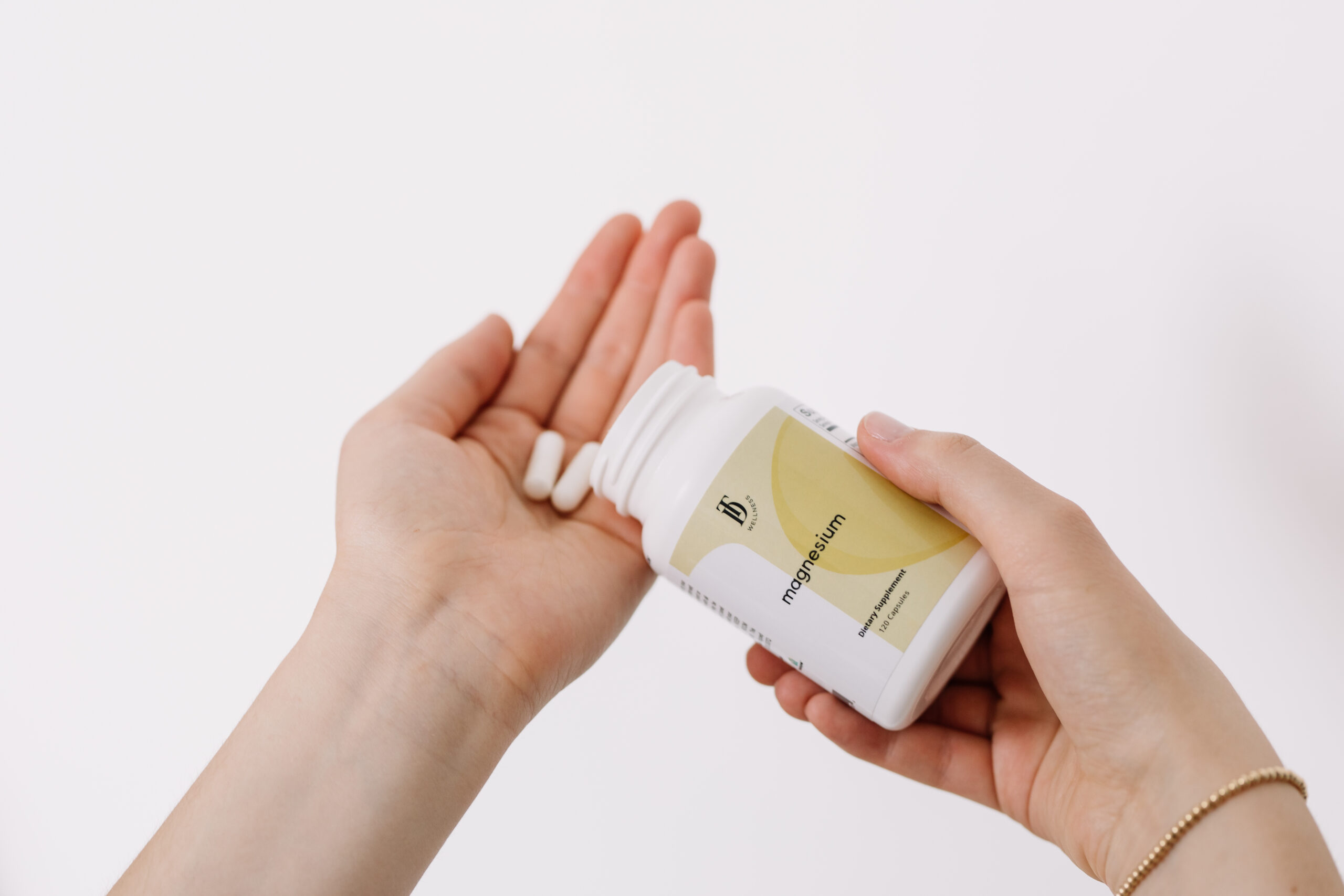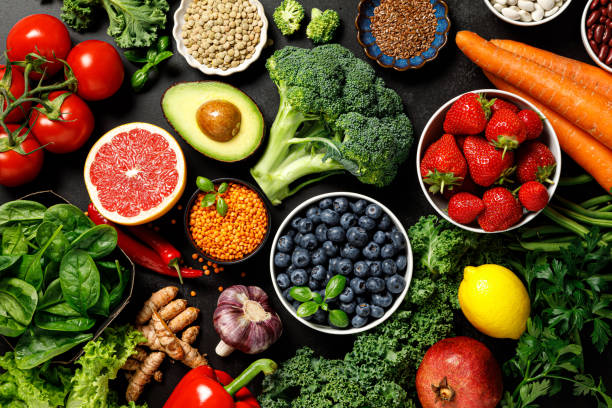Am I Addicted to Sugar? 8 Tips to Break the Sugar Habit

I love my chocolate as much as the next girl, but there’s a dangerous side to sweet treats that you may not be aware of.
Most Americans know that sugar is bad for their health. You got the message that it can cause brain fog, weight gain, diabetes, and even heart disease. While you know the risks, the temptations are real, and you may not be able to stop yourself. That’s because your body could quite literally be addicted to sugar.
If you’ve ever thought to yourself, “I would love to take sugar out of my diet, but it’s so dang hard! Am I addicted to sugar?” Don’t worry. It’s not about willpower, it is biochemical. Your body is programmed to like sugar. It doesn’t help that the food industry hides sugar in just about everything.
In this article, I’m going to share all about sugar addiction, what sugar does to your body, why you should consider cutting out sugar, and how to break sugar addiction. If you want to break free from your sugar addiction, keep reading!
How Does Sugar Affect Your Body?
The United States is obsessed with sugar. The average American consumes about 57 pounds of added sugar a year. Worse, a strawberry-flavored yogurt can have up to 20 grams of sugar in one 6oz serving! With all that sugar circulating around, one has to wonder how it affects your body, right?
Sugar is a carbohydrate that you can easily find in MANY foods. The body uses carbohydrates for energy and breaks down carbs into sugars. But, there are different types of sugars based on their molecular structure. For example, monosaccharides have just one sugar molecule making them a simple sugar. Glucose and fructose are examples of monosaccharides. Polysaccharides have more than one sugar molecule and include sucrose, lactose, and starch.
The body breaks down carbohydrates into glucose, which enters the bloodstream and acts as a source of energy.
Some sugars, such as glucose, fructose, and lactose, occur naturally in foods and drinks. Meanwhile, added sugars refer to any sugars in foods that are not naturally occurring, such as sugar in baked goods…or hidden in your salad dressings.
Unfortunately, an excess of glucose in the blood can result in high blood sugar levels and is a precursor to insulin resistance, pre-diabetes, diabetes, and obesity.
Besides being used for energy, sugar also releases a hormonal response in your body. When you consume sugar it stimulates the dopamine reward circuit. This releases dopamine which results in feelings of pleasure and euphoria. So you’ll want more and more sugar.Yikes!
Is Sugar Addiction Real?
If you’re wondering, “Am I addicted to sugar?” The answer is very likely! The dopamine reward circuit leads us to sugar addiction. The brain’s reward circuitry is designed to increase an organism’s likelihood of engaging in behaviors that increase its chances of survival. That means your body is going to push you to consume more sugar, regardless of what your mind has to say about the matter.
Research shows that there is increasing evidence for sugar addiction. In fact, the behaviors that are associated with sugar consumption are related to neurochemical changes in the brain that also occur with addictive drugs. Sugar can be as addicting as alcohol or drugs.
It doesn’t help that sugar hides in plain sight.
Hidden Names for Sugar
The food industry likes to add sugar to everything. About 80 percent of food items packaged in grocery stores contain added sugar. 80%! Here are a few of the names to look out for when trying to cut sugar from your diet.
-
raw sugar
-
corn sweetener or syrup
-
high fructose corn syrup
-
brown sugar
-
coconut sugar
-
fruit juice concentrates
-
honey
-
molasses
-
maple syrup
-
invert sugar
-
malt sugar
-
dextrose
-
Fructose
-
Maltodextrin
-
glucose
-
maltose
-
sucrose
-
lactose
-
syrup
Now, am I sayings all of these forms of sugar are bad? No, of course not. But where the problem lies is that they are hidden in everything, so the amount and frequency of sources of sugar can add up easily. For me personally, I consume coconut sugar, maple syrup and honey, but not everyday in excess.
Negative effects of sugar on the body
-
Sugar and Gut Health
Sugar promotes gut dysbiosis or an imbalance in the beneficial bacteria that live inside your GI tract. The bacteria that live in your intestines thrive on carbohydrates, both the “good” and the “bad” variety. Sugar can also lead to increased candida overgrowth.
Complex carbs, such as soluble fiber found in starchy plants like squash or sweet potatoes, feed beneficial gut bacteria. They also boost anti-inflammatory gut microbiota and discourage the growth of pathogenic bacteria. But, the consumption of processed carbs and refined sugar triggers the growth of harmful gut bacteria and promotes an inflammatory gut microbiota.
-
Sugar and Hormones
Sugar is also detrimental to the balance of hormones in your body. Consuming too much sugar disrupts the hormone insulin and causes insulin resistance. This leads to high blood sugar and excess fat storage.
You see, when insulin spikes, typically after a meal high in sugar, it lowers levels of an essential protein known as sex hormone-binding globulin (SHBG). SHBG binds excess estrogen and testosterone in the blood, but when it’s low, these hormone levels increase. Insulin also increases the production of testosterone, which is then converted into even more estrogen by fat tissue in the belly.
These effects mean the ratio of estrogen to progesterone, known for keeping us calm and happy, is way too high, leading to irritability, anxiety, insomnia, and more.
-
Sugar and Inflammation
Consumption of refined sugar has been linked to impaired immune function. Alterations in the gut microbiota induced by refined sugar intake may set off an immune response, which in turn contributes to impaired immune function and chronic inflammation. Read my blog on how to Daily Detox Practices to Reduce Inflammation.
Benefits of Cutting Out Sugar
There are so many benefits of cutting out sugar from your diet! Here are a few of them:
-
Feel more energized throughout the entire day
-
Improve your heart health
-
Promote a healthy immune system
-
Enhance your mental function
8 Tips on How to Break Sugar Addiction
Getting over any type of addiction is hard, and sugar addiction is no different. While it may not be a piece of cake, you can break free from the cycle and stop pondering, “Am I addicted to sugar?” Here are 8 tips to help you break sugar addiction for good.
1. Prepare for sugar withdrawal symptoms – Withdrawal from sugar can lead to several mental and physical challenges. Mood changes due to a lack of dopamine and anxiety and nervousness due to drops in blood glucose levels could occur. You may also have trouble concentrating, sleep issues, and physical discomfort.
2. Be realistic – Cutting sugar all at once is not likely to happen. Instead, try and focus on decreasing your sugar consumption week by week. This is much more achievable and realistic.
3. Look for hidden sugars – Get comfortable with all the various names for sugar and start reading the ingredient labels on food before you purchase it. When possible choose real, whole foods rather than processed foods.
4. Avoid artificial sweeteners – there are plenty of natural sweeteners, for example, maple syrup, raw honey, coconut sugar, dates/ date paste. Keep in mind that these sweeteners, though natural, are only a crutch to help you resolve your sugar cravings altogether. You can certainly add them back into your diet once you have broken your sugar addiction, but until then it’s best to avoid them.
5. Eat more fiber, protein, and healthy fats – When looking to detox from sugar, consume a balanced diet with plenty of fiber from fruits and vegetables, proteins from different sources like meat, fish, and eggs, and healthy fats like fish, avocado and olive oil.
6. Stay hydrated – swap sugary drinks for fruit-infused filtered water.
7. Get good sleep – a good night of sleep will help to keep your sugar cravings under control. Sleep deprivation can disrupt your circadian rhythm and the signalling of the satiety hormone leptin and increase the hunger hormone ghrelin, causing you to eat more.
8. Exercise regularly – exercising regularly can help you deal with withdrawal symptoms, by replacing the dopamine high that you get from sugar with the dopamine high you get from exercise.
Get Your Gut Right
If you need access to a stool test, a gut health expert, and personalized protocols, the Get Your Gut Right program might be the right fit for you. This is a very comprehensive program that also focuses on nutrition, detox pathways, nervous system, clean environment, and more. Click HERE to learn more.
Stay Updated With Exciting News at Taylor Dukes Wellness!
We are always working on new ways to serve you on your health journey. Be the first to know about new offerings, health articles, and more by clicking here and filling out your information so we can be in touch.
Share This Post:
Your Wellness Deep Dive
- Be the first to learn about new healthy living resources, blog posts, and exclusive TDW offerings by getting on my insider list.
- Find healthy living products with ingredients you can trust – the same ones I personally use for myself and my family – in the TDW Shop. Check out our protein powders, electrolytes, supplements, and more!
- Get personalized support through the TDW Community. When you become a member, you get access to functional medicine expertise from me and my team, functional medicine lab testing and 1:1 consults, a digital library of exclusive wellness content, live monthly Q&As with me, and so much more!
YOU MAY ALSO LIKE:
Helping you get your gut right, improve energy, boost immunity, balance hormones, sleep better and look + feel your best
DISCLAIMER
PRIVACY POLICY
TERMS + CONDITIONS
ACCESSIBILITY
© 2025 Taylor Dukes Wellness
LEARN
SHOP
ABOUT
TDW Community
Free Guides
Blog
TDW Store
Fullscript
About Taylor
Press
Contact
COOKIE POLICY
SITE CREDIT
Trusted Products



